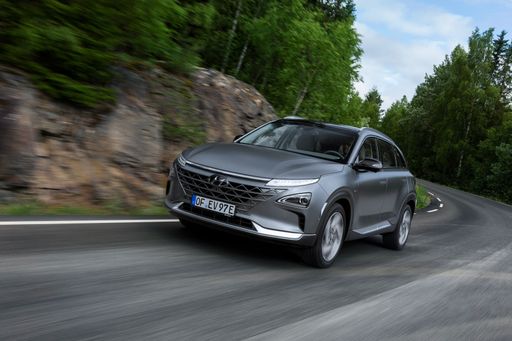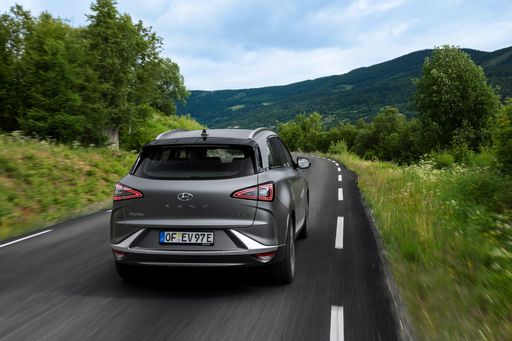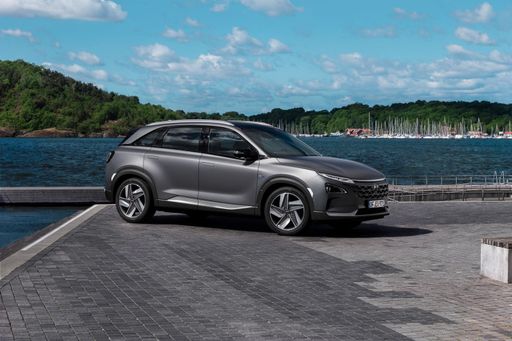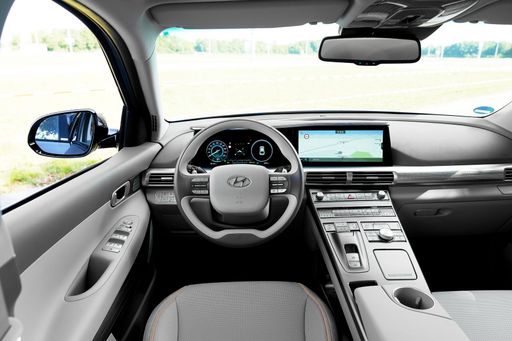Toyota C-HR VS Hyundai Nexo – Specs, Efficiency & Price Comparison
Which model is the better choice – the Toyota C-HR or the Hyundai Nexo? We compare performance (223 HP vs 163 HP), boot capacity (447 L vs 461 L), efficiency (0.80 L vs ), and of course, the price (29100 £ vs 66400 £).
Find out now which car fits your needs better!
The Toyota C-HR (SUV) is powered by a Full Hybrid or Plugin Hybrid engine and comes with a Automatic transmission. In comparison, the Hyundai Nexo (SUV) features a Hydrogen engine and a Automatic gearbox.
When it comes to boot capacity, the Toyota C-HR offers 447 L, while the Hyundai Nexo provides 461 L – depending on what matters most to you. If you’re looking for more power, you’ll need to decide whether the 223 HP of the Toyota C-HR or the 163 HP of the Hyundai Nexo suits your needs better.
There are also differences in efficiency: 0.80 L vs . In terms of price, the Toyota C-HR starts at 29100 £, while the Hyundai Nexo is available from 66400 £.
Compare all the key specs now and find out which model fits your lifestyle best!
Toyota C-HR
The Toyota C-HR stands out with its distinctive and bold design that combines sleek, angular lines with a sporty posture. Its comfortable and stylish interior is equipped with advanced technology features, providing a seamless driving experience. The vehicle offers impressive handling and performance, making it a compelling choice for those who appreciate a blend of practicality and flair on the road.
details @ Toyota
@ Toyota
 @ Toyota
@ Toyota
 @ Toyota
@ Toyota
 @ Toyota
@ Toyota
 @ Toyota
@ Toyota
Hyundai Nexo
The Hyundai Nexo stands out in the automotive world as a pioneering hydrogen fuel cell vehicle, offering an eco-friendly alternative to conventional engines. Its sleek design combines modern aesthetics with advanced technology, providing a comfortable and futuristic driving experience. The Nexo not only represents a significant step towards sustainable motoring but also impresses with its smooth and silent performance on the road.
details @ hyundai.news
@ hyundai.news
 @ hyundai.news
@ hyundai.news
 @ hyundai.news
@ hyundai.news
 @ hyundai.news
@ hyundai.news

|

|
|
|
|
Costs and Consumption |
|
|---|---|
|
Price
29100 - 42800 £
|
Price
66400 - 71000 £
|
|
Consumption L/100km
0.8 - 5.1 L
|
Consumption L/100km
-
|
|
Consumption kWh/100km
-
|
Consumption kWh/100km
-
|
|
Electric Range
68 km
|
Electric Range
666 km
|
|
Battery Capacity
-
|
Battery Capacity
-
|
|
co2
17 - 115 g/km
|
co2
0 g/km
|
|
Fuel tank capacity
43 L
|
Fuel tank capacity
6 L
|
Dimensions and Body |
|
|---|---|
|
Body Type
SUV
|
Body Type
SUV
|
|
Seats
5
|
Seats
5
|
|
Doors
5
|
Doors
5
|
|
Curb weight
1505 - 1755 kg
|
Curb weight
1889 kg
|
|
Trunk capacity
350 - 447 L
|
Trunk capacity
461 L
|
|
Length
4362 mm
|
Length
4670 mm
|
|
Width
1832 mm
|
Width
1860 mm
|
|
Height
1558 - 1564 mm
|
Height
1630 mm
|
|
Payload
375 - 425 kg
|
Payload
451 kg
|
Engine and Performance |
|
|---|---|
|
Engine Type
Full Hybrid, Plugin Hybrid
|
Engine Type
Hydrogen
|
|
Transmission
Automatic
|
Transmission
Automatic
|
|
Transmission Detail
-
|
Transmission Detail
Reduction Gearbox
|
|
Drive Type
Front-Wheel Drive, All-Wheel Drive
|
Drive Type
Front-Wheel Drive
|
|
Power HP
140 - 223 HP
|
Power HP
163 HP
|
|
Acceleration 0-100km/h
7.4 - 9.9 s
|
Acceleration 0-100km/h
9.2 - 9.5 s
|
|
Max Speed
175 - 180 km/h
|
Max Speed
177 - 179 km/h
|
|
Torque
-
|
Torque
395 Nm
|
|
Number of Cylinders
4
|
Number of Cylinders
-
|
|
Power kW
103 - 164 kW
|
Power kW
120 kW
|
|
Engine capacity
1798 - 1987 cm3
|
Engine capacity
-
|
General |
|
|---|---|
|
Model Year
2024 - 2025
|
Model Year
2018 - 2021
|
|
CO2 Efficiency Class
C, B
|
CO2 Efficiency Class
A
|
|
Brand
Toyota
|
Brand
Hyundai
|
Toyota C-HR
Revolutionising the Crossover Segment: The Toyota C-HR
The Toyota C-HR has firmly established itself as a standout contender in the compact crossover segment. Known for its distinct design and hybrid capabilities, the C-HR continues to prioritise innovation and efficiency. In this article, we delve into the technical details that make the 2024 iteration a compelling choice for discerning buyers.
Distinctive Design and Aerodynamics
The Toyota C-HR boasts a striking design that combines angular lines with modern aesthetics. This isn't merely for show; the design enhances aerodynamics, improving fuel efficiency and handling. With dimensions of 4362mm in length and a sophisticated structure, the C-HR strikes a balance between urban agility and on-road stability.
Impressive Hybrid Powertrains
The C-HR lineup offers innovative hybrid and plug-in hybrid drivetrain options. The full hybrid system is tailored for those who seek both economic and environmental benefits. It combines a petrol engine with an electric motor to deliver power outputs ranging from 140 to 223 PS, achieving remarkable fuel consumption rates from 0.8 to 5.1 L/100km. The 2.0 Plug-In Hybrid variant impresses with an electric range of 67 km, ideal for urban commuters.
Unmatched Efficiency and Performance
Acceleration figures for the C-HR range from 7.4 to 9.9 seconds to reach 0-100 km/h, ensuring a responsive driving experience. Maximum speeds between 175 and 180 km/h cater to those who appreciate a bit of zest on the open road. Coupled with CVT automatic transmission and both front-wheel and all-wheel-drive configurations, the C-HR adapts to various driving conditions with ease.
Advanced Technology and Features
Inside, the C-HR is equipped with the latest technology aimed at providing connectivity and comfort. The model hosts an array of features across its diverse trim levels, including Business Edition, Lounge, and the sporty GR SPORT. Each variant is designed to meet the demands of different lifestyles, ensuring there's a C-HR model to suit every taste.
Sustainability and Cost Efficiency
With CO2 emissions ranging from 19 to 115 g/km, the C-HR stands as a testament to Toyota's commitment to sustainability. Financially savvy consumers will also appreciate the running cost, with monthly expenses from €959 to €1204, and a cost per km as low as 38.4 cents. Such efficiency makes the vehicle an attractive option for eco-minded buyers.
Conclusion: A Forward-Thinking Choice
The 2024 Toyota C-HR embodies Toyota's forward-thinking approach to automotive innovation, blending eco-friendly hybrid technologies with stylish design and practicality. It offers a glimpse into the future of driving, where efficiency meets elegance. Whether you're a city dweller or an adventure seeker, the C-HR promises a driving experience that is both enjoyable and environmentally conscious.
Hyundai Nexo
Introducing the Hyundai Nexo: A Step into the Future of Automobiles
The Hyundai Nexo represents a groundbreaking stride in the realm of hydrogen-powered vehicles, aligning cutting-edge technology with environmental sustainability. As an SUV, it offers an impressive blend of performance, efficiency, and style, challenging the conventional norms of automotive engineering.
Advanced Hydrogen Technology
At the heart of the Hyundai Nexo's innovation is its hydrogen fuel cell powertrain, a marvel that enables the vehicle to achieve zero CO2 emissions, boasting a remarkable CO2-Effizienzklasse of A. This SUV offers the dual advantages of an eco-friendly footprint with the substantial performance of a traditional combustion engine.
Impressive Performance Metrics
Equipped with a robust 120 kW (163 PS) motor, the Nexo can accelerate from 0 to 100 km/h in a commendable span of 9.2 to 9.5 seconds. This makes the Nexo not just a green choice but also a viable option for those who value brisk acceleration and dynamic driving capabilities. Furthermore, the vehicle manages a top speed of 177 to 179 km/h, showcasing its ability to hold its own on motorways.
Efficient Design and Spacious Comfort
The Nexo’s dimensions, at 4670 mm in length, 1860 mm in width, and 1630 mm in height, underline its role as a spacious and practical SUV. Inside, it comfortably seats up to five occupants, ensuring a luxurious ride experience complemented by its 461-litre boot capacity, ideal for both daily commutes and longer journeys.
State-of-the-Art Features
Hyundai's commitment to excellence is evident in the Nexo’s suite of advanced features. The Prime-Paket trim offers sophistication and practicality, integrating seamless technology with high-quality materials that redefine interior comfort and style. Despite its avant-garde hydrogen technology, Hyundai hasn't compromised on the intuitive user experience.
Cost and Efficiency Analysis
With monthly running costs between €1680 and €1786 and variable costs per kilometre from 67.2 to 71.5 cents, the Hyundai Nexo is an investment in future-oriented automotive excellence. Its distinctive lack of CO2 emissions assures potential owners of its sustainability, while its running costs reflect the premium nature of its innovative technology.
Conclusion: The Future is Hydrogen
The Hyundai Nexo serves as a testament to the potential of hydrogen as a mainstream fuel source. By offering leading-edge technology, notable performance, and unbeatable efficiency, the Nexo positions itself as a beacon of future mobility. For those ready to embrace the next chapter of automotive evolution, the Nexo awaits as a stellar option.
The prices and data displayed are estimates based on German list prices and may vary by country. This information is not legally binding.
